Francis Brake was having a bad hair day. You know it’s bad when you get heckled while walking around a night market.
“Your haircut sucks,” someone told him. “You need a new one.”
The man with the blunt words was Louis Lee, (李俊生) 46, co-owner of Slick Barbershop in Taichung. He then offered Brake a free haircut. That was three years ago. Brake, a 32 year old Canadian, now lays down NT$800 every month for the latest hair trend: closely trimmed sides and long on the top. The 45-minute-long haircut includes a straight razor shave above the ears.
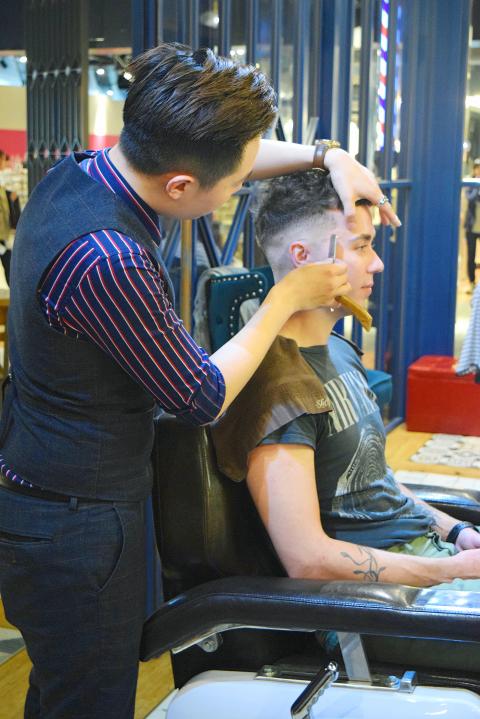
Photo: John Evans
“I didn’t know about these kinds of places before,” Brake said after getting a trim on a recent Saturday afternoon. “I know I’m going to get a good haircut here.”
While typical barbers might charge a few hundred New Taiwan dollars — with ones in the countryside costing even less — more millennials with disposable income have decided to go high end when it comes to their hair needs.
Of the thousands of barbershops in Taiwan, a handful have sprouted up in recent years that specialize in high-end haircuts tailored for men. It’s a throwback to a bygone era.
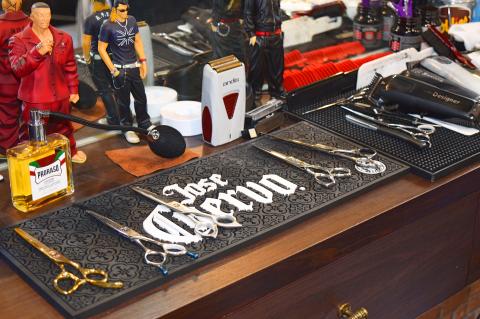
Photo: John Evans
There are roughly 30 such barbershops in Taiwan, according to the Asia Barber Association, an industry trade group based in Guangzhou, China. Lee, who serves as president of the association’s Taiwan region, expects this number to rise in the future.
MACULINITY AND BELONGING
While husbands might go to the same uni-sex hair salon as their wives, high-end barbershops are hoping to lure them away, playing up the feeling of masculinity and belonging. It’s a recent trend — going along with the growth in businesses specializing in men’s accessories, whether it’s custom made shoes or tailors with a gentlemen’s club-like atmosphere.
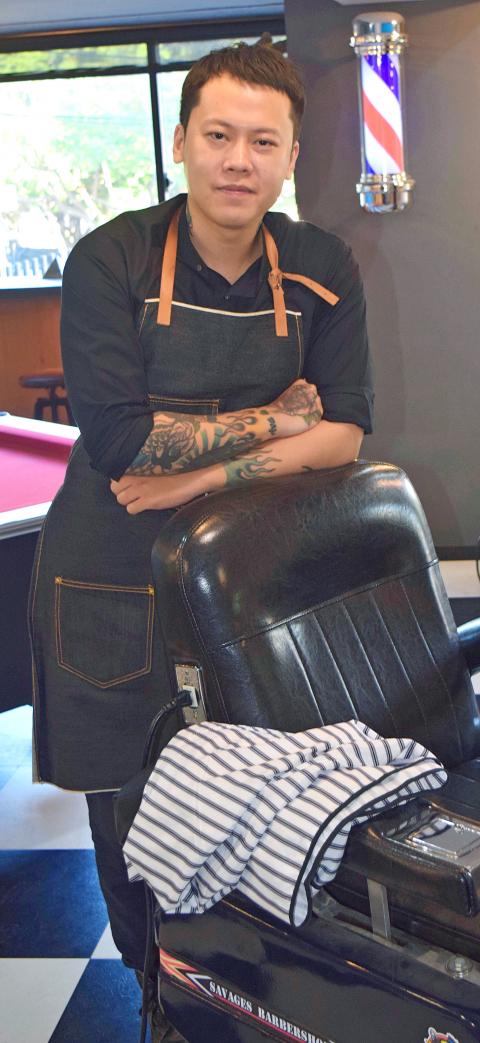
Photo: John Evans
“It’s something that men should experience,” Lee said. Slick, of which there are five in Taichung, recreates a feeling of a period more fitting of the 1940s and 1950s.
Adding to this mood is a movie poster of The Godfather, with a tuxedoed Marlin Brando looking over one of the barbershops.
Or in modern terms, Lee wants to recreate the feeling of the Kingsman movies, where finely-dressed spies outwit villains.
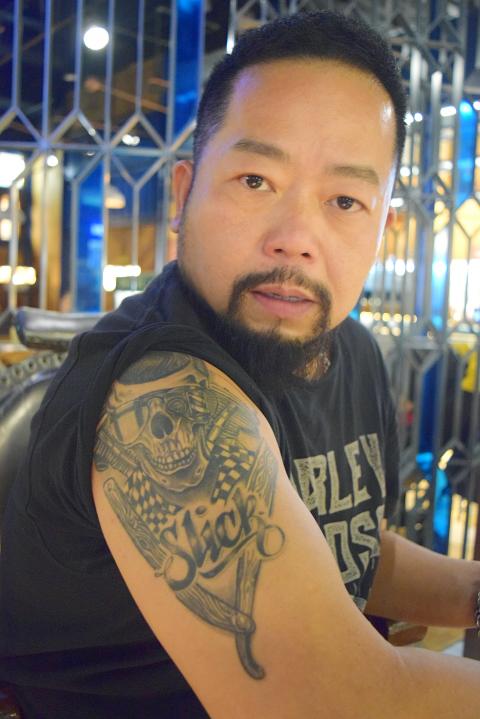
Photo: John Evans
Playing up this sense of coolness, whiskey, beer and coffee are offered complimentary.
“Getting a good haircut is kind of like a ceremony,” Lee said. “The goal is to get customers to relax and enjoy themselves.”
While Lee has the model down now, making it a business opportunity was by chance.
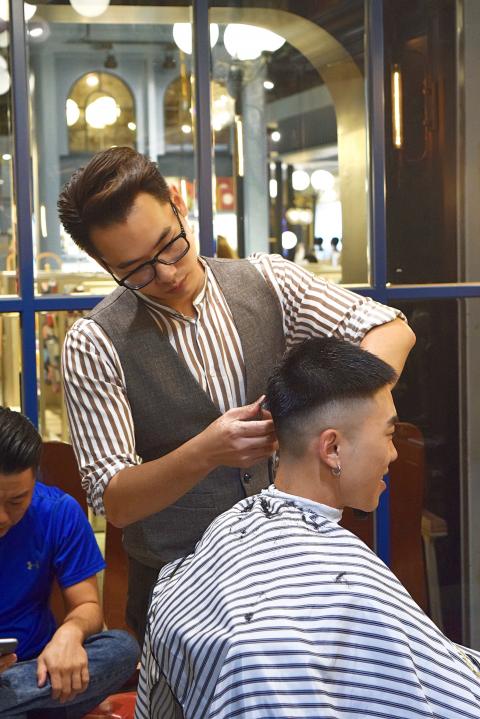
Photo: John Evans
Lee and his friend opened up a small shop in a Taichung night market three years ago that featured one barber’s chair and two Harley-Davidson motorcycles. The barber’s chair was so old that it came with an attached ashtray. Admittedly, it was a place to look cool.
“It was like making a man cave,” Lee said.
But unexpectedly, customers came — and kept returning. What was once just for fun, became a real business. Now business is booming, and Lee imagines opening more branches of Slick in the Taipei area.
At 200 haircuts per month, barber Hong Yu-yao (洪渝耀) is in demand. The 24 year old, clad in a tie, vest and patent leather shoes, is often booked a week in advance. Businessmen and other white-collar workers make up the bulk of his customers.
CUT AND A CHAT
While the cuts are often similar — short on the sides, floppy on the top — the topics of conversation vary with each customer. Aside from movies and sports, Hong chats about girlfriends, wives and love, doling out advice when needed.
“They’re not just my customers. They’re my friends,” said Hong, who is studying hair design at a local university.
Across town at Savages Barbershop it’s hard to miss the giant barber sign with ubiquitous red, blue and white stripes. The Taichung barbershop’s pool table and impressive collection of alcoholic drinks gives the place a social club-like atmosphere.
“It’s not just a barbershop,” said Harry Fu (傅華偉), 32, who co-owns three branches of Savages in Central Taiwan. “It’s a place where men can go to relax and be themselves.”
The music is ‘90s hip-hop and the walls are decorated with photos, including those of scantily clad women.
On the television one recent afternoon, the adult comedy Ted was being shown.
“No romantic comedies here,” Fu said.
While the style of Savages is loud and rebellious, it’s still all about the haircuts.
With eight retro-looking barber chairs, the barbershop specializes in the popular pompadour style. A shave and a haircut goes for NT$1,000. Fu said he drew inspiration for the business from traditional Western barbershops. As for Taiwan’s past history with barbershops, many were known less for their haircuts and more for places to meet women.
“I asked myself why Taiwan didn’t have any real barbershops,” Fu said. “And that’s what we wanted to make, a real barbershop.”

In recent weeks the Trump Administration has been demanding that Taiwan transfer half of its chip manufacturing to the US. In an interview with NewsNation, US Secretary of Commerce Howard Lutnick said that the US would need 50 percent of domestic chip production to protect Taiwan. He stated, discussing Taiwan’s chip production: “My argument to them was, well, if you have 95 percent, how am I gonna get it to protect you? You’re going to put it on a plane? You’re going to put it on a boat?” The stench of the Trump Administration’s mafia-style notions of “protection” was strong

Every now and then, it’s nice to just point somewhere on a map and head out with no plan. In Taiwan, where convenience reigns, food options are plentiful and people are generally friendly and helpful, this type of trip is that much easier to pull off. One day last November, a spur-of-the-moment day hike in the hills of Chiayi County turned into a surprisingly memorable experience that impressed on me once again how fortunate we all are to call this island home. The scenery I walked through that day — a mix of forest and farms reaching up into the clouds

With one week left until election day, the drama is high in the race for the Chinese Nationalist Party (KMT) chair. The race is still potentially wide open between the three frontrunners. The most accurate poll is done by Apollo Survey & Research Co (艾普羅民調公司), which was conducted a week and a half ago with two-thirds of the respondents party members, who are the only ones eligible to vote. For details on the candidates, check the Oct. 4 edition of this column, “A look at the KMT chair candidates” on page 12. The popular frontrunner was 56-year-old Cheng Li-wun (鄭麗文)

Oct. 13 to Oct. 19 When ordered to resign from her teaching position in June 1928 due to her husband’s anti-colonial activities, Lin Shih-hao (林氏好) refused to back down. The next day, she still showed up at Tainan Second Preschool, where she was warned that she would be fired if she didn’t comply. Lin continued to ignore the orders and was eventually let go without severance — even losing her pay for that month. Rather than despairing, she found a non-government job and even joined her husband Lu Ping-ting’s (盧丙丁) non-violent resistance and labor rights movements. When the government’s 1931 crackdown